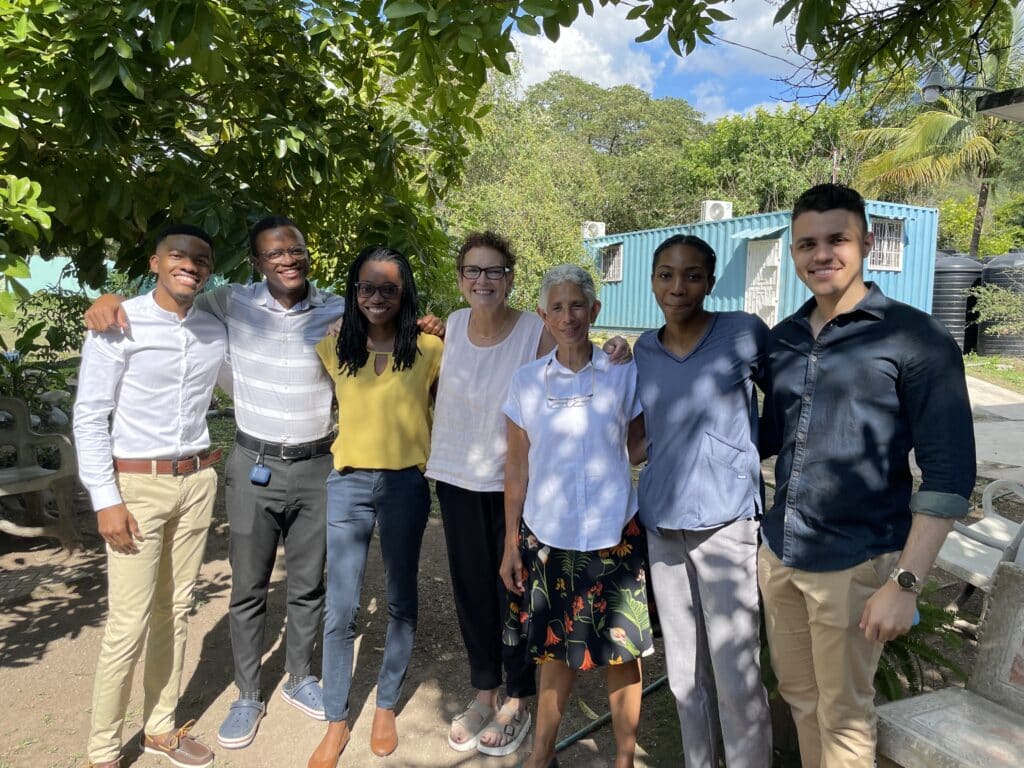By: Joy C. Liu, MD MPH

Dingle Spence, MBBS
Dingle Spence grew up with curiosity and open-mindedness about the natural world. “I think one of the things that has really informed my life is my mother’s deep immersion in nature. From a very young age, she was teaching me about plant names and animal names. I was not raised to be scared,” she said. Her experiences with Jamaican bush medicine, Chinese medicine, and psychedelics have led her to practice medicine with an expansiveness that integrates different traditions to help patients heal.
“In Jamaica, we have a very rich tradition of what we call ‘bush medicine.’ A very deep, long, wide tradition of people using various herbs and teas for every single ailment you can think of,” she said. When she got sick as a child, her grandmother made her baths filled with leaves and herbs. Although being taught which substances are poisonous is the extent of most Jamaican medical students’ education about bush medicine today, Dingle grew up understanding its ability to heal.
Her family modeled a love for biology in all its forms. Her mother, an English physician who came to Jamaica during anesthesia residency in the 1950s, taught her about plants and animals. Her father, a Jamaican oncologist, often took her to the hospital to show her photos and pathology slides. “I’m raised by doctors and I always knew that I wanted to be a doctor,” she said.
She studied medicine in Jamaica before moving to the UK for oncology training. But the field’s protocols and rigidity left her feeling increasingly stifled. Halfway through her oncology fellowship in 1991, she moved to Beijing for 6 months to study traditional Chinese medicine, fascinated by the distinct way it conceived of mind, body, disease, and healing.
In Beijing, she saw a traditional Chinese doctor for severe dysmenorrhea that was disabling despite high-dose NSAIDs. She took the prescription to a traditional pharmacy lined top to bottom with little wooden drawers and walked out with a brown paper package. “I boiled the tea, and it came out like black tar. I drank it twice a day, went back to the guy, got another prescription that was the complete opposite. It was full of flowers. And [I] never had another period pain again,” she recalled.
“You see what I mean, Western medicine can’t do that. Western medicine can put you on the pill, it can give you painkillers, but Western medicine doesn’t understand. What Chinese medicine did for me was rebalance my system,” Dingle said. When she went back to the UK as a trained acupuncturist, she offered it to patients whose symptoms might improve with its use.
After she finished her oncology training, she went into palliative care. “For me, that’s where the art of medicine, the art of communication, the art of how you can really help this person and their family [is].” After 5 years at a hospice in the UK, she returned home to Jamaica to work at a public hospital as an oncologist and palliative care physician. During her 2-decade career, she has helped establish an oncology research center, launched education programs, and increased access to palliative care throughout the Caribbean.

Spence with the Jamaica Cancer Care and Research Institute
Later in her career, she started exploring psychedelics for therapeutic purposes. In 2020, she had her first therapeutic experience with psychedelics, which are legal in Jamaica. “It was a very important time for me because my mom had died 6 weeks before and we were extremely close,” she said. “What a good way to explore looking after other people’s grief by exploring your own grief.”
She received training and became a facilitator for Jamaica Grief Retreats, a 6-day retreat that combines group bereavement support with two group psilocybin experiences for parents who have lost children. To date, the organization has hosted 4 retreats for parents of 21 children who died suddenly and unexpectedly. Many parents found the experience therapeutic for processing complicated emotions: “Can you express joy? Are you allowed to be happy again, ever? Because the minute that you’re happy again, does that mean [you’re] betraying [your] child?” Dingle explained. “I think what we’re able to do is provide a safe enough of a container.”
Dingle’s sole experience with psychedelics in palliative care occurred when she facilitated a psychedelic experience for a woman with stage 4 breast cancer. “She had a transformational experience,” said Dingle. “She felt like an angel came down to her and told her it was time to go. And that she had about 3 months, and that she should put her affairs in order…And that she was not to be afraid. And that just changed her.”
The experience was also transformative for Dingle. “There’s a way that I was able to sit with people and be present,” she said. “It took my connection presence to another level once I had used psychedelics.”
Dingle’s personal experience, knowledge, and training in bush medicine, traditional Chinese medicine, and psychedelics, among other modalities, has earned her a reputation as a physician whom patients and colleagues can go to for advice about integrative medicine. “People will say, hey I’ve got this patient who’s really interested in using cannabis as medicine, can you advise?” she said.
While there are differences in the philosophical approach of various medicinal traditions, there is no tension for Dingle. It ultimately distills down to one question: “How can we integrate things from different traditions that can be supportive of the healing of people?” Her career has been an exploration of that question—seeing the beauty of each tradition, recognizing its uses and limitations, and blending them together in practice.
Maybe that is where integration can truly start. “As long as it’s not harmful, people are willing to try anything to… feel better. And that’s space that I really love,” she said. “Be open-minded. Recognize that there are things outside our conventional training that are very powerful.”